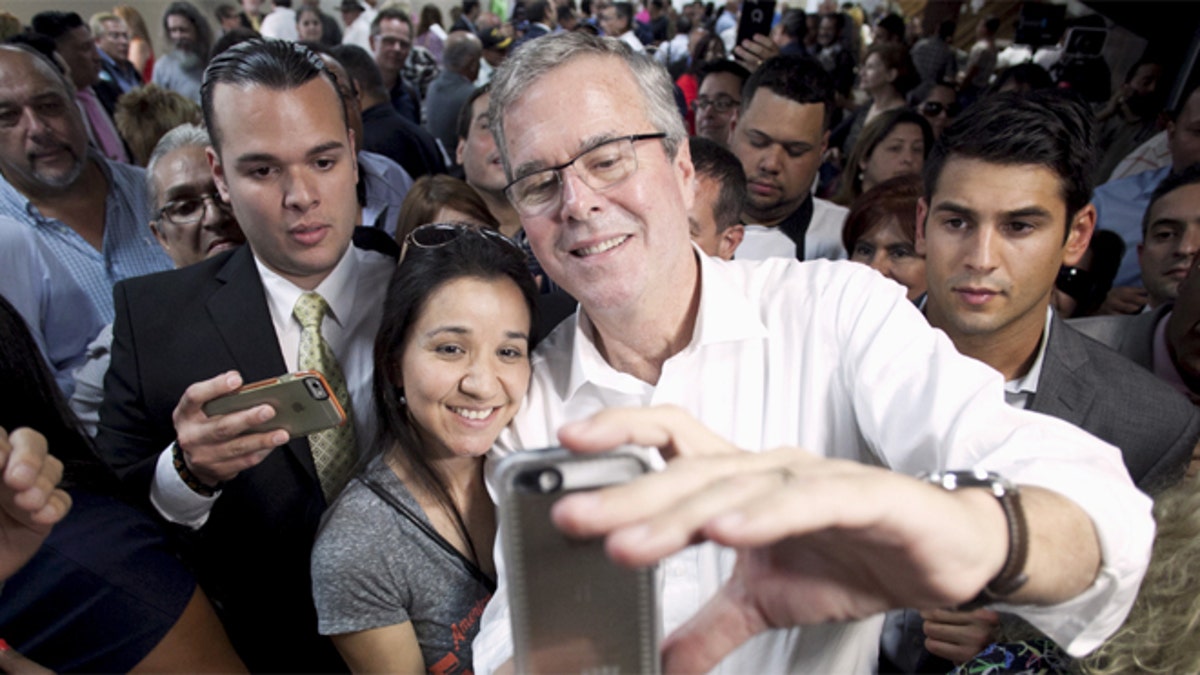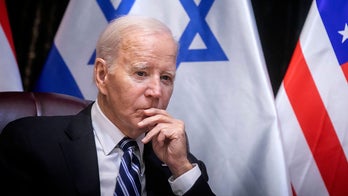
FILE: April 28, 2015: Probable 2016 GOP presidential candidate and former Florida Gov. Jeb Bush (white shirt) poses for a selfie during a town hall meeting in San Juan, Puerto, Rico. (REUTERS)
Republican presidential hopefuls trying to break from the crowded primary field are taking to cutting-edge social media to connect with more and younger voters, in the latest sign that -- come 2016 -- GOP candidates are determined to close the digital divide with historically tech-savvy Democrats.
While still stumbling on some digital basics, the fluid procession of Republicans jumping into the 2016 race are showing a willingness to experiment. Not only blanketing social-media megaphones Facebook and Twitter, the campaigns are road-testing new apps in a bid to quickly build their circle of political friends.
Earlier this week, former Hewlett-Packard chief executive Carly Fiorina announced her candidacy on Facebook and Twitter, but then turned to the video-streaming app Periscope to connect more directly with voters.
In the hyper-paced world of social media, Twitter-owned Periscope debuted shortly before the Fiorina announcement, and allows users to broadcast and view live events on mobile devices. And its video-streaming rival, Meerkat, has been up and running only since late February. Already, both are being used heavily in the presidential campaign.
Kentucky Sen. Rand Paul -- one of more than a dozen Republicans who have either announced a 2016 White House bid or are considering one -- was the first in the pack to use the Meerkat smartphone app. He live-streamed a March 15 appearance at the South by Southwest festival, in Austin, Texas.
Craig Agranoff, a Florida-based digital marketer specializing in political campaigns, predicts that video streaming will be to the 2016 race what Facebook was to President Obama’s 2008, and to a lesser extent, 2012 victories -- reaching millions of young and previously untapped voters.
He says voters love the interactive, real-time aspect of the medium, compared with watching a candidate give a scripted speech on TV or a webcast.
“It’s like, ‘Wow, Rand Paul answered my question,’” Agranoff said.
And candidates, he says, also love the medium because it skirts the news media filter and has an effect similar to meeting prospective voters in, say, a hometown parade -- only 1,000 fold.
“It’s like a virtual handshake. It’s pounding the cyber flesh,” he said. “But you can reach a million people.”
Fiorina campaign spokeswoman Sarah Isgur Flores said the video-streaming event was a success, attracting roughly 600 people just on Periscope, and not including those who submitted questions on Twitter and a teleconference line.
“Carly is always looking for new ways to engage people,” Flores told FoxNews.com. “So taking questions from people across the country ... is a great way to get the ball rolling. I expect you'll see us doing more things like this throughout the campaign.”
Still, Fiorina took heat for failing to register the domain name CarlyFiorina.org, which was commandeered by a Fiorina critic who used the site to highlight her having laid off 30,000 employees while at Hewlett-Packard.
Late-night host Seth Meyers mentioned the site on his show Tuesday night, after Fiorina announced. Fiorina responded deftly, saying, “It’s pretty funny. Do you know who owns sethmeyers.org? I do. I just bought it in the green room so you better be nice to me tonight.”
Fiorina was the second 2016 GOP White House candidate to fail to register a key domain name before officially launching a campaign. Texas Sen. Ted Cruz also didn’t register TedCruz.com, which is being used to back Obama and immigration reform.
Another potential trouble spot comes in hiring the campaigns' tech gurus. Earlier in the year, likely candidate and former Florida Gov. Jeb Bush hired a 31-year-old to be his political action committee’s new chief technology officer, only to fire him days later amid news reports about disparaging remarks he made online years earlier about gays, women and minorities.
Bush's team also accidentally made public some Florida residents’ Social Security numbers, email addresses and other personal information with the online release of roughly 275,000 emails exchanged from his two terms as governor. The Bush team in part blamed Florida officials for failing to remove the sensitive data before its release and reportedly said the CTO was still being vetted when the news broke about his online past.
But such incidents have fed into the narrative that Republicans still trail Democrats in the digital battle to identify voters and win them over.
Bush, though, is diving into the 2015 social media scene, too. Four days after Paul, he also used Meerkat, to live-stream an event in Atlanta to Twitter followers.
Beyond Obama’s well-known and successful use of such social media tools, on which he raised money and connected personally with potential voters, Obama won both campaigns decisively with superior voter databases and voter-contact operations.
Republicans thought they had a response in 2012 -- nominee Mitt Romney’s digital get-out-the-vote apparatus, named Orca, that was supposed to provide real-time voter-turnout information but instead crashed on Election Day.
Undeterred, the Republican National Committee came back in 2014 with a combination data-collection and field operation that they said could contact the last undecided voter in a race’s final hours.
To be sure, the RNC had a very successful election cycle -- taking control of the Senate and adding to the Republicans’ House majority.
The RNC earlier this week announced the hiring of Gerrit Lansing as the group’s chief digital officer, replacing 2014 mastermind Chuck DeFeo, who departed for i360, the Koch brothers-backed data and analytics firm.
“Gerrit’s depth of experience has given him valuable insight into the ever-evolving world of digital campaigning, and we are fortunate to be able to take advantage of his unique knowledge,” RNC Chairman Reince Priebus told FoxNews.com. “As the 2016 election cycle draws closer, the RNC remains committed to surpassing the extraordinary successes of 2014.”
Lansing previously worked for the National Republican Congressional Committee as a digital director. Prior to that, he served as a House Budget Committee press secretary and new media director for Illinois GOP Rep. Peter Roskam.
Strategists agree that winning the White House next year will require campaigns to spend more on digital and that they must go beyond having a superior social media effort to include successful TV ads, field operations and mailings, though they disagree about the mix.
“I just throw the mailers in the garbage with the Terminix and real estate ads,” argued Agranoff, who still believes in the power of Facebook and email, which he calls “the best bang for your buck” for getting lots of grassroots, $10 campaign contributions.
He says Facebook remains the best way to reach the most people and credits the site for continuing to stay profitable and ahead of the political landscape by charging campaigns for “likes” and voter-targeted ad buys.
“They’re doing some really cool things to stay in front of eyeballs,” he said.



